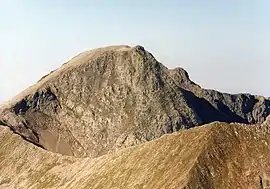List of mountains of the British Isles by height
This is a list of mountains in Britain and Ireland by height and by prominence. Height and prominence are the most important metrics for the classifications of mountains by the UIAA; with isolation a distant third criterion.[lower-alpha 2][2] The list is sourced from the Database of British and Irish Hills ("DoBIH")[lower-alpha 3] for peaks that meet the consensus height threshold for a mountain, namely 600 metres (1,969 ft); the list also rules out peaks with a prominence below 30 metres (98 ft), and thus, the list is therefore precisely a list of the 2,754[lower-alpha 4] Simms in the British Isles (as at October 2018).[3][4] Many classifications of mountains in the British Isles consider a prominence between 30–150 metres (98–492 ft) as being a "top", and not a mountain; however, using the 30 metres (98 ft) prominence threshold gives the broadest possible list of mountains. For a ranking of mountains with a higher prominence threshold use:
- List of Marilyns in the British Isles, for ranking by height and by prominence, of peaks with prominence over 150 metres (492 ft); or
- List of P600 mountains in the British Isles, for ranking by height and by prominence, of peaks with prominence over 600 metres (1,969 ft)
| Highest mountains in Britain & Ireland ("Simms" classification) | |
|---|---|
 Ben Nevis, in the Scottish Highlands, is the highest mountain in Britain and Ireland | |
| Highest point | |
| Elevation | over 600 m (1,969 ft) |
| Prominence | over 30 m (98 ft) |
| Geography | |
| Location |
|
As of 2 July 2020, 6,768 people had climbed all 282 Scottish Munros,[5] as of April 2020 11 people had climbed all 1,557 Marilyns of Great Britain,[lower-alpha 5][6] while as of May 2020 only 3 people have completed the 2,531 Simms of Great Britain,[lower-alpha 6] Ken Whyte (Cruachan Beag 21/09/2010), Iain Thow (Cut Hill 07/06/2015) and Michael Earnshaw (Cruach Fhiarach 16/07/2019), all of whom have also completed the Irish and IOM Simms too, so including all 2,755 Simms of the British Isles.[7] On 5 December 2018, the BBC announced that Foel Penolau had been re-surveyed and promoted to Hewitt status (and by definition, to Simm status).[8] Also, Cyrniau Nod has been replaced as a Marilyn (hill) by Foel Cedig.
Coverage of Simms
Despite using the lower threshold for prominence of 30 metres (98 ft), the UIAA threshold for an "independent" peak,[2] one Scottish Munro is missing, namely Maoile Lunndaidh whose official prominence changed to 11 metres (36 ft) in 2014;[lower-alpha 7][lower-alpha 8] As of October 2018, the list of 2,754 British Isles Simms contained:
- 281 of the 282 Scottish Munros, and 158 of the 227 Scottish Munro Tops;
- All 222 Scottish Corbetts, all 219 Scottish Grahams, and all 118 Scottish New Donalds;
- All 872 of the 2,011 British Isles Marilyns with a height are above 600.0 m;
- All 524 of the England, Wales, and Ireland Hewitts;
- 117 of the 541 Lake District Birketts (of which 99 are Wainwrights), that meet the Simms criteria;
- All 224 of the 407 Irish Arderins with a height above 600.0 m;[lower-alpha 1]
- All of the 120 P600 ("major") mountains in the British Isles;
- 33 of the 34 England, Wales, and Ireland Furths.[lower-alpha 9]
Simms by height by prominence
This list was downloaded from the DoBIH in October 2018, and includes all British and Irish peaks with a prominence below 30 metres (98 ft).[lower-alpha 3] Note that topographical prominence is complex to measure and requires a survey of the entire contours of a peak, rather than a single point of height.[12] These tables are therefore subject to being revised over time, and should not be amended or updated unless the entire DoBIH data is re-downloaded again. The default table ranking is by height, so where the table is sorted by for example Region, the table will list the mountains within each Region by order of height.
DoBIH codes
The DoBIH uses the following codes for the various classifications of mountains and hills in the British Isles, which many of the above peaks also fall into:[13][14]
- Ma Marilyn
- Hu HuMP
- Sim Simm
- 5 Dodd
- M Munro
- MT Munro Top
- F Furth
- C Corbett
- G Graham
- D Donald
- DT Donald Top
- Hew Hewitt
- N Nuttall
- Dew Dewey
- DDew Donald Dewey
- HF Highland Five
- 4 400-499m Tump
- 3 300-399m Tump (GB)
- 2 200-299m Tump (GB)
- 1 100-199m Tump (GB)
- 0 0-99m Tump (GB)
- W Wainwright
- WO Wainwright Outlying Fell
- B Birkett
- Sy Synge
- Fel Fellranger
- CoH County Top – Historic (pre-1974)
- CoA County Top – Administrative (1974 to mid-1990s)
- CoU County Top – Current County or Unitary Authority
- CoL County Top – Current London Borough
- SIB Significant Island of Britain
- Dil Dillon
- A Arderin
- VL Vandeleur-Lynam
- MDew Myrddyn Dewey
- O Other list (which includes):
- Bin Binnion
- Bg Bridge
- BL Buxton & Lewis
- Ca Carn
- CT Corbett Top
- GT Graham Top
- Mur Murdo
- P500 P500
- P600 P600
- Un unclassified
- s sub
- x deleted
suffixes:
= twin
See also
- Lists of mountains and hills in the British Isles
- List of mountains in Ireland
- List of Munro mountains in Scotland
- List of Murdos (mountains)
- List of Furths in the British Isles
- List of Marilyns in the British Isles
- List of P600 mountains in the British Isles
Notes
- As of October 2018, the Irish MountainViews Online Database, list the prominence of Knockbrinnea (W) as 29m, and Carrignabinnia as 27 m, and thus they do not qualify as Irish Arderins, which means that MountainViews does not classify these two peaks as Simms; the total number of Irish Arderins over 600 m is thus 222. The DoBIH however uses the Harvey Tables which list the prominence for both at 30 m, and thus the DoBIH class them as Irish Simms, giving 224 Irish Simms in total.
- No definition of a British Isles mountain or hill uses an explicit quantitative metric of topographic isolation (e.g. distance to the next point of equal height), however, the concept of isolation is embedded in the qualitative definition of a Scottish Munro, from the Scottish Mountaineering Club requirement of "sufficient separation" (instead of prominence).[1]
- The Database of British and Irish Hills ("DoBIH") is the most referenced database for the classification of peaks in the British Isles,[10] and the DoBIH is licensed under a "Creative Commons Attribution 3.0 Unported License".[11]
- Some sites list 2,753 Simms, however, the Database of British and Irish Hills ("DoBIH") has added an extra Irish Simm, Knockbrinnea (W), bringing the total as at June 2020 to 2,755.
- Does include the IOM, but does not include the 454 Marilyns on the Island of Ireland
- Does not include IOM or Ireland
- 281 of the 282 Scottish Munros have an official OSI prominence above 30 m, except Maoile Lunndaidh, who was found in a 2014 survey to be lower than nearby Creag Toll a' Choin.[9] Thus, Maoile Lunndaidh had its official prominence downgraded from 400 m to just under 11 m, and the 400 m of prominence given to Creag Toll a' Choin. Note that Creag Toll a' Choin had previously been a Munro until older surveys downgraded its status in favour of Maoile Lunndaidh.
- There is no known "composite" list of British Isles mountains that merges the Munro definition with other defined lists; the closest defined lists that include almost all Munros, are those that reduce the minimum prominence threshold to 30 metres (98 ft).
- 33 of the 34 SMC Furths have a prominence above 30 metres (98 feet), however, Caher West Top in Ireland, has a prominence of 24 metres (79 feet).
References
- "Munros". Scottish Mountaineering Club. 2018.
The list of distinct Scottish peaks of 3000ft (914.4m) and over, of "sufficient separation" from their neighbouring peaks. The list that was originally drawn up by Sir H.T. Munro in the Scottish Mountaineering Club Journal in 1891 was unfinished at the time of his death. Munro did not write down a precise definition of what he meant by "sufficient separation", though the character of a mountain did enter into it. Through regular use these hills have become known as the Munros.
- "MOUNTAIN CLASSIFICATION". UIAA. March 1994.
- "The SIMMs". HillBaggingUK.
The Simms: A Simm is a hill in England, Wales or Scotland over 600m high with a drop of at least 30 metres all-round. Simm is an acronym for Six-hundred Metre Mountain. The Irish and Isle of Man Simms are also listed on this website. A Subsimm is a hill which just fails (by up to 10m) to qualify on the drop rule, i.e. over 600m with 20–29m drop.
- "Background to the lists". Database of British and Irish Hills. 2 August 2018.
- Clerk of the List (2 July 2020). "Compleators". Scottish Mountaineering Club.
The SMC holds a record of Munros, Corbetts, Grahams and Donalds compleators.
- "The Marilyn Hall of Fame (Marhof)". The Relative Hills of Britain (rhb.org.uk). 31 December 2017.
- "Simm Hall of Fame". The Relative Hills of Britain (rhb.org.uk). 6 July 2017.
A Simm is a hill in Britain that is at least 600 metres high and has a drop of at least 30 metres on all sides. Only two people are known to have climbed all 2528 Simms, but anyone with at least 2000 Simms is eligible for the Simm Hall of Fame. As this is a distant target for many baggers, the Simm Corridor is open to those who have climbed at least 1500 Simms.
- "Foel Penolau: How a Welsh hill became a mountain". BBC News. 5 December 2018. Retrieved 6 December 2018.
While Foel Penolau is over the 2,000ft (609.6m) required to be a mountain, the minimum drop between the col - the lowest point on a ridge between two peaks - and summit was under 98ft. The pair have found that the drop has now increased to 104.6ft, and is, therefore, a mountain. As a result of the survey, Foel Penolau has been included in the list of Hewitts - hills in England, Wales or Ireland over 2,000ft high which have a minimum drop of 98ft.
- Alan Dawson. "Surveying Report 2014". The Relative Hills of Britain (rhb.org.uk).
Creag Toll a'Choin was never officially a twin but turned out to be 0.35m higher than Maoile Lunndaidh. This was a surprise, as some OS maps show Maoile Lunndaidh to be 2m higher, so a second survey was carried out to confirm the finding.
- Jackson, Mark. "More Relative Hills of Britain" (PDF). Relative Hills of Britain. Archived from the original (PDF) on 12 October 2013. Retrieved 9 September 2011.
- "Copyright". Database of British and Irish Hills. 3 August 2018.
We place no restrictions on use of the data by third parties and encourage authors of other websites and applications to do so. We just ask users to observe the terms of the Creative Commons licence
- Alan Dawson (March 2016). "Surveying and mapping standards". The Relative Hills of Britain (rhb.org.uk).
- "Classification". Database of British and Irish Hills. 3 August 2018.
- "Welcome to the online version of the Database of British and Irish Hills (DoBIH)". HillBagging. Retrieved 8 November 2018.
External links
- The Database of British and Irish Hills (DoBIH), the largest database of British Isles mountains
- Hill Bagging UK & Ireland, the searchable interface for the DoBIH
- MountainViews: The Irish Mountain Website, the DoBIH for Ireland (Republic and North)
- MountainViews: Irish Online Mountain Database, the searchable database for the MountainViews
- The Relative Hills of Britain, a website dedicated to mountain and hill classification
